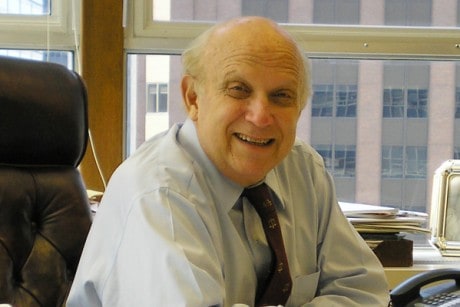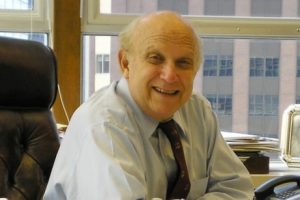
 These remarks by the noted First Amendment expert were delivered in New York last night (Oct. 23) at the 15th anniversary dinner of the Foundation for Individual Rights in Education (FIRE), the foremost protector of free speech in higher education.
These remarks by the noted First Amendment expert were delivered in New York last night (Oct. 23) at the 15th anniversary dinner of the Foundation for Individual Rights in Education (FIRE), the foremost protector of free speech in higher education.
***
This is an extraordinarily perilous moment with respect to free speech on campuses around the nation. It sometimes seems as if students—too many of them, anyway—seem to want to see and hear only views they already hold. And that colleges and universities seem willing to pander to that desire. And to participate in limiting what other may wish to see and hear. On bad days, it reminds of an old New Yorker cartoon in which one member of the Supreme Court whispers to another, “Do you ever have a day when everything seems so unconstitutional?” And even on good ones, it’s sure disturbing.
For every judicial decision striking down one speech code or another in publicly funded universities, it sometimes seems that another dozen are adapted. For every absurd, outrageous, humiliating speech—destructive withdrawal of already made invitations for prominent individuals to speak on campus, another and still another seems to occur.
This does not happen, as it might have many years when I was in college, simply because an all-powerful administration disapproved of the speakers. (I well recall when I entered Cornell that I was required to sign some document agreeing that I could be suspended for just about anything, including not carrying the ID card they gave me saying just that.) Now university administrators seem terrified of others disapproving of the views of outside speakers—sometimes a tiny minority of students, sometimes real or potential donors, sometimes imagined critics. Whatever the causes, the repetitive acts of speech suppression within and by our academic institutions persist and seem to grow.
There are only two meaningful sorts of responses to such acts. One is litigation. And only FIRE, only FIRE, would think of and then respond to the explosion of unconstitutional speech codes that limit student and faculty speech as it did just last month by threatening over 300 colleges with litigation challenging such rules. And only FIRE would do the detailed work of reading each speech code so it could announce that 58% of public colleges and universities are, right now, acting unconstitutionally in limiting sometimes discomforting but First Amendment protected speech, on campus, and then follow that up by actually commencing lawsuits in this area.
If litigation is one necessary tactic to deal with such speech-limiting policies, the other is simply exposure of the misconduct, with the attendant public shame that follows the exposure. What, after all, other than shame is deserved by Brandeis for offering and then withdrawing an honorary degree to Ayaan Hirsi Ali for her criticism of Islam; by Smith College for withdrawing an invitation Christine Lagarde, the first woman to head the IMG; by Rutgers, for so embarrassing former Secretary of State Condoleezza Rice that she declined to appear. And just a few weeks ago, George Will’s invitation to speak at Scripps College in California was effectively withdrawn after controversy about the invitation.
And would you believe, as Chief Justice Loretta Preska of the United States District Court for the Southern District of New York pointed out in a recent address, even here in New York, in 2012, when the College Republicans at Fordham University invited Ann Coulter to speak on campus, “the uproar caused the group unceremoniously to rescind the invitation.”
What’s going on? It is hard to resist the conclusion that too many of our college students evidently needed high school civics courses since they seem to have no idea what the basic thrust of the First Amendment—and free expression more broadly—is all about. And they are not alone. It students me how many people—educated people, including scholars—seem to believe that the First Amendment should be interpreted as nothing but an extension and embodiment of their generally liberal political views.
But think about what the First Amendment and the Bill of Rights generally are all about. Justice Robert Jackson put it this way: “The very purpose of a Bill of Rights is to foreclose public authority from assuming a guardianship of the public mind through regulating the press, speech, and religion. In this field every person must be his own watchman for truth, because the forefathers did not trust any government to separate the true from the false for us.” That’s not uniquely liberal or conservative; it is freedom-protecting, nothing more or less.
One should really not have to say that of all places, campuses should be most protective of the broadest level of freedom of speech. Or that speakers should be permitted to have their say, instead of being booed off stage as former New York City Police Commissioner Ray Kelly was at Brown last year. Or that it is disgraceful that, as FIRE’s findings reveal, that such topics as abortion, gay rights, and the “war on terror,” were “the cause of many disinvitation incident,” that the amount of disinvitation incidents “has risen dramatically” over the past 15 years; and that Harvard—you’ve heard of Harvard, I’m sure—has the most disinvitation incidents. I don’t often quote William F. Buckley Jr., but on learning that, it’s hard not to recall his observation that “I’d rather be governed by the first 2000 people in the Boston telephone directory that the entire faculty at Harvard.”
What can one say about this other than to quote from the statement of the American Association of University Professors that, in the clearest language, observed that “[o]n a campus that is free and open, no idea can be banned or forbidden. No viewpoint or message may be deemed so hateful or disturbing that it may not be expressed.” Oliver Wendell Holmes put it well, when he was a Harvard undergraduate before the Civil War and was a student editor of Harvard Magazine. “We must,” he wrote in 1859, “have every though brought before us when we are young, and we may as well at once prepare for it.”
And yet, that is not the reality on college campuses today. In 1998, when Alan Charles Kors and Harvey Silverglate wrote “The Shadow University,” their groundbreaking study of freedom of speech on campus, they concluded that “[c]ontrary to the expectations of most applicants, colleges and universities are not freer that the society at large. Indeed, they are less free, and that diminution is continuing apace. In a nation whose future depends upon an education in freedom, colleges and universities are teaching the values of self-censorship, and self-righteous abuse of power.” That was true in 1998, when their book was published and, alas, it seems even more true today.
FIRE, from the day it was created, has understood this and sought to expose it and deal with it. We are in the midst of an epidemic and FIRE is providing an antidote. From me, and I’m sure from you, thank you.
Confused, inept to meet the expectations of today’s Universities, let alone prospective employers, and society, in general, are thousands of underdeveloped students being taught the wonderful value of achieving victimhood. They suffer becoming obdurate, neurasthenia protesters without a real cause or understanding of who they are or where they might fit in. Thank the Common Core Socialists, progressive faculty, that is hell-bent on themselves keeping tenure, being
accepted, and ensuring Govt.funding for the transformation of what used to be America.
Sad to say it but I no longer think of Floyd Abrams as much of a supporter of free speech. His recent statements about the Metropolitan Opera production of “The Death of Kinghoffer” make one question the strength of his convictions. On the topic of the opera, Abrams wrote in the WSJ: “Leon Klinghoffer’s murder was an unspeakable act. Period. His demise is not a proper subject of debate …”
Rubbish. Floyd Abrams has no standing to tell other people what they should or shouldn’t debate. Rather than embrace the vigorous discussion of a contentious topic, Abrams seems to think that he is some sort of arbiter that gets to decide which debates are worthwhile. Sad to see such a strong defender of free speech fall so far.
Colleges and Universities have been running roughshod over students’ civil rights for too long. It’s as though they have established a separate legal system to enforce the indoctrination that so often happens on campus. I plan to sue my College and establish some much needed case precedent in Education Law. Please support my effort at http://www.gofundme.com/suevalencia